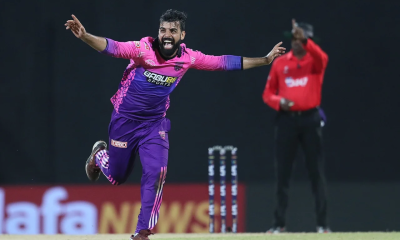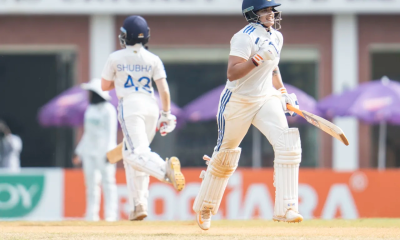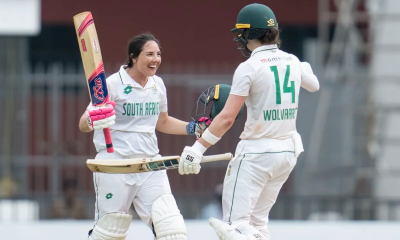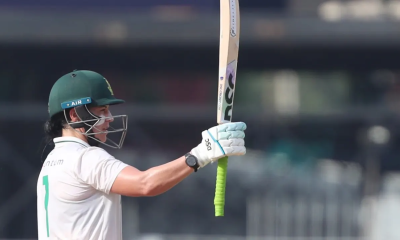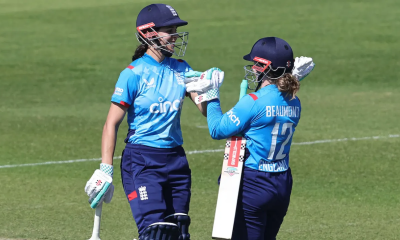Editorial
The State of Cricket

Thursday’s parliamentary debate of the state of affairs at Sri Lanka Cricket (SLC) will surely resonate with all lovers of cricket. There is no need to labour over the fact that few things are right, and most things are wrong at SLC. That obviously affects the morale of the players as well as the national psyche. Sports Minister Roshan Ranasinghe’s declaration that many covetous (political) eyes are being cast on his portfolio because of the big bucks SLC commands needs no elaboration.
Many are the men who served the game because of their passion for the sport. But cricket has become a multi-million dollar business nowadays and there’s intense rivalry to win cricket elections while most decent men keep away from contesting. As Muttiah Muralitharan once said, if he contests the General Elections from any district, he will win it hands down but he didn’t stand a chance to win the SLC elections.
Robert Senanayake’s contributions to cricket were immense as he functioned as President of the Board of Control of Cricket for 16 long years uninterrupted. After him, other notable politicians like Dr. N.M. Perera, T.B. Werapitiya, Lakshman Jayakody and Tyronne Fernando headed the board. Cricket in Sri Lanka got a facelift when Gamini Dissanayake, a powerful Minister of JRJ’s government took charge in 1981.
By this stage, Sri Lanka’s bid for full membership of the International Cricket Council had been turned down on several occasions with the sport’s founding members England and Australia using their veto powers. Dissanayake, a meticulous planner, got down the Australian cricket officials to Colombo prior to the ICC meeting in 1981 and showcased to them the standard of the sport in the country and the cricket infrastructure. When he went for the Lord’s meeting that year, Australia supported Sri Lanka’s bid and once the Aussies were on board, England felt that they were fighting a losing battle.
Dissanayake succeeded in his first attempt helping the country gain Test status. He was surrounded by other capable men like Killy Rajamahendran, Neil Perera, Nisal Senaratne, S. Skandakumar, Anura Tennekoon et al. There was smooth sailing and under the visionary stewardship of Ana Punchihewa, the country went onto win the World Cup in 1996. Yet, a mere two weeks after the World Cup triumph, Punchihewa lost the reelection with his deputies Upali Dharmadasa and Thilanga Sumathipala challenging him. It was a bitterly contested election and even NCC’s representative voted against the wish of the club’s mandate.
The club duly suspended their representative but Dharmadasa in his wisdom made the individual a member of the national selection panel. Since then, it has been all downhill for the sport. Big money has been spent on cricket elections and ICC investigations have exposed how a board chairman paid a Sports Minister from a television deal, the money that was supposed to have been spent on development of the sport.
Former President Chandrika Kumaratunga did try to address the issue. In 1999, she sacked the board and put in place the first ever Interim Committee with reputed banker Rienzie T. Wijetilleke as the Chairman. Wijetilleke was never a cricketer but what he brought into the board was financial discipline. Sri Lankan cricket thrived in the early 2000s with other capable men like Hemaka Amarasuriya and Vijaya Malalasekara heading the board.
However, with Chandrika gone, politicians misused Cricket Interim Committees appointing their buddies to this august body, some of whom had contested the cricket elections and lost. What Parliament debated on Thursday is merely the tip of the iceberg. True, a colossal sum had been wasted on purchasing air tickets for the kith and kin of Executive Committee members of SLC. But there are more serious issues that need to be investigated.
In 2018, instructions were sent from the CEO’s office to the company that owned the television rights of SLC to transfer funds to an offshore account. SLC lost huge sums of money and despite intensive investigation, the findings have been pushed under the carpet and nobody has been punished.
Journalists who expose corruption at SLC have been punished with their accreditation to cover games revoked. Three journalists are considered persona non grata by the SLC. The board has also taken over 10 media institutions to court this year effectively putting an end to their criticism. This has been a major blow for press freedom and something that had never happened before.
The Sports Minister made some pertinent points in Parliament where he exposed that the board had been spending millions of rupees as legal fees to cover their tracks. The Minister went onto say that lack of discipline among players is because the board itself did not maintain the right standards. As a result, a Sri Lankan cricketer was jailed in Australia and currently he is on bail awaiting the verdict from a Sydney court after allegations of sexual harassment.
It must be also mentioned that three players were sent home from England two summers ago for breaching the bio-secure bubble. A retired judge who conducted the investigations recommended a two-year suspension for bringing the game into disrepute and lack of remorse. SLC in their wisdom reduced the suspension to one year and further brought it down letting the players off with a mere slaps on the wrist.
Under the current administration, the Test captain was charged for drunk driving while another contracted player was involved in a hit and run incident at Panadura three years ago. He was released on bail and while on bail, SLC went ahead and appointed him as the Vice-Captain of the national cricket team. So much for the standards in cricket.
Mike Brearley, one of the finest captains the game has seen, in his book, ‘The Art of Captaincy’ goes onto comment that a fish rots from its head. That exactly what has been happening to Sri Lanka Cricket.
Editorial
Jekylls and Hydes

Monday 29th December, 2025
Sri Lankan politicians love the media dearly and take up the cudgels for the rights of journalists when they are out of power. The JVP/NPP leaders also defended the media to the hilt while they were languishing in the Opposition. Jekylls become Hydes after being ensconced in power, with the media exposing their failures and malpractices. Those who can, do; those who cannot, attack the media, one may say of the governments in this country, with apologies to Bernard Shaw.
The JVP-led NPP government, angered by bad press, is all out to intimidate the media it cannot control. Previous governments had the police on a string and used them to attack and harass independent journalists. The incumbent administration has gone a step further; the police have reportedly written to the Telecommunications Regulatory Commission (TRC), asking for action against Hiru TV for what they describe as broadcasting unverified, misleading news. Thus, the government has used the police to give Hiru a choice between toeing the official line and losing its licence. Thankfully, its efforts have run into stiff resistance, with media institutions and various associations circling the wagons around Hiru.
If the government thinks Hiru or any other media institution disseminates false information to the detriment of its interests, legal avenues are available for it to seek redress. The police must not be used as a political tool to intimidate the media.
Among the current defenders of the media are the SLPP, the UNP, the SLFP, etc. Their leaders are shedding copious tears for Hiru. But it was while the UNP and SLPP leaders were in power that the suppression of media freedom and violence against journalists became institutionalised for all intents and purposes. UNP governments not only throttled media freedom but also murdered journalists. SLFP regimes had media institutions attacked and journalists killed. An SLFP-led government, with the current SLPP leaders at the helm, had media institutions torched and journalists abducted, assaulted and murdered. These sinners currently in the political wilderness are condemning other sinners in power for suppressing media freedom.
The government deserves the bad press it gets. The police have been reduced to a mere appendage of the JVP/NPP. Two of the NPP’s Retired Police Collective members, namely former Senior DIG Ravi Seneviratne and former SSP Shani Abeysekera, have been appointed Secretary to the Public Security Ministry and CID Director, respectively. Absurd claims the police make in defence of the government remind us of Matilda, whose dreadful lies made one gasp and stretch one’s eyes.
When the police were asked why NPP MP Asoka Ranwala had not been subjected to a breathalyser test immediately after a recent road accident he caused, they had the chutzpah to claim they had run out of test kits. They transferred two of their officers over the incident to enable the government to save face. They arrested one of their own men assaulted by an NPP MP following a recent police raid on a cannabis cultivation in Suriyakanda. Acting just like legendary King Kekille, they let the MP off the hook and arrested the policeman, who was bailed out; they went on to suspend him from service. A few months ago, they unashamedly sided with a group of JVP cadres who stormed a Frontline Socialist Party office in Yakkala and forcibly occupied it. They go out of their way to ensure that the arrests of drug dealers with links to the Opposition get maximum possible publicity, but they do their best to keep the media in the dark when narcotics dealers with ruling party connections are taken into custody. They crack down on Opposition politicians and activists but steer clear of government members and their supporters. The despicable manner in which they are doing political work for the government reminds us of the Gestapo. Now, they are zeroing in on Hiru TV at the behest of their political masters for exposing their sordid actions.
The only way the NPP government can overcome problems and challenges on the political front and shore up its crumbling image is to mend its ways and fulfil its election pledges while taking action against its errant members who have brought it into disrepute and turned public opinion against it. Shooting the messenger is not the way to set about the task.
Editorial
Executive brinkmanship

Pressure is mounting on President Anura Kumara Dissanayake to ensure that an Auditor General is appointed without further delay. But he has remained unmoved. He is determined to wear down the Constitutional Council (CC) and appoint one of his party loyalists as Auditor General. The CC has rejected his nominees—and rightly so; they are not eligible. Former Executive Presidents went all out to railroad the CC into rubber-stamping their decisions. They had no qualms about doing so while claiming to uphold the independence of the public service. President Dissanayake has failed to be different. His refusal to compromise amounts to brinkmanship; he is waiting until the CC blinks.
The NPP’s election manifesto, A Thriving Nation: A Beautiful Life, attributes the deterioration of the public service to ‘political appointments’ and state workers making political decisions. Among the steps the NPP has promised to take to straighten up the public service are ‘merit-based appointments and promotions’. This principle has fallen by the wayside where the question of appointing the Auditor General is concerned.
The government should take cognisance of the possible negative effects of the prolonged delay in appointing the Auditor General during a period of disaster response and international relief and rebuilding support.
The Bar Association of Sri Lanka has called upon President Dissanayake to appoint a person with proven competence, integrity, and independence, who commands wide acceptance as Auditor General forthwith. It has stressed the need to appoint a nonpartisan professional as the Auditor General to safeguard the integrity of the National Audit Office and inspire the confidence of both citizens and international partners in the financial governance of the State.
Transparency International Sri Lanka, the Civil Society Organizations (CSOs) and the other good governance activists, too, have faulted President Dissanayake and his government for the inordinate delay in appointing the Auditor General. They are of the view that a strong, independent Auditor General enables Parliament and the public to scrutinise government expenditure, identify irregularities, prevent misuse of funds, and ensure that those entrusted with public resources are held to account. The delay in appointing the Auditor General has weakened the effectiveness, authority, and the independence of the entire public audit system and created space for inefficiency, mismanagement, and corruption, they have noted. The situation will take a turn for the worse if the government succeeds in having one of its cronies appointed Auditor General.
The government is apparently playing a waiting game in the hope that the reconstitution of the CC due next year will provide a window of opportunity for it to appoint one of its loyalists as Auditor General.
Why the government is so desperate to place a malleable person at the helm of the National Audit Office is not hard to understand. If it succeeds in its endeavour, the next Auditor General will be beholden to the JVP/NPP. When an ineligible person is elevated to a high post, he or she naturally becomes subservient to the appointing authority. Such officials go out of their way to safeguard the interests of their political masters in case of irregularities involving state funds and other accountability issues.
A protracted delay in appointing the Auditor General or the appointment of a government supporter to that post will increase the risk of mismanagement of state funds and corruption, lead to the erosion of public trust and confidence in the National Audit Office, undermine legislative oversight and impair fiscal discipline. Most of all, the government’s failure to appoint a competent, independent person of integrity as Auditor General will diminish donor confidence especially at a time when the country is seeking disaster relief funds from the international community. There is no way the government can justify its refusal to appoint the current Acting Auditor General as the head of the supreme audit institution. He is obviously the most eligible candidate.
Editorial
Selective transparency

Saturday 27th December, 2025
The NPP government has released a cordial diplomatic letter from Indian Prime Minister Narendra Modi to President Anura Kumara Dissanayake, and gained a great deal of publicity for it as part of a propaganda campaign to boost Dissanayake’s image. Such moves are not uncommon in politics, especially in the developing world, where the heads of powerful states are deified and their visits, invitations and letters are flaunted as achievements of the leaders of smaller nations. However, the release of PM Modi’s letter to President Dissanayake is counterproductive, for it makes one wonder why the government has not made public the MoUs it has signed with India?
PM Modi’s Sri Lanka visit in April 2025 saw the signing of seven MoUs (or pacts as claimed in some quarters) between New Delhi and Colombo. Prominent among them are the MoUs/pacts on the implementation of HVDC (High-Voltage Direct Current) Interconnection for import/export of power, cooperation among the governments of India, Sri Lanka, and the United Arab Emirates on developing Trincomalee as an energy hub, and defence cooperation between India and Sri Lanka.
The NPP government has violated one of the fundamental tenets of good governance––transparency; there has been no transparency about the aforesaid MoUs or pacts, especially the one on defence cooperation. They cannot be disclosed without India’s consent, the government has said. This is a very lame excuse. The JVP/NPP seems to have a very low opinion of the intelligence of the public, who made its meteoric rise to power.
When the JVP/NPP was in opposition, it would flay the previous governments for signing vital MoUs and pacts without transparency. But it has kept even Parliament in the dark about the MoUs/pacts in question.
Ironically, the JVP, which resorted to mindless violence in a bid to scuttle the signing of the Indo-Lanka Accord in 1987, has sought to justify the inking of an MoU/pact on defence cooperation between Sri Lanka and India and keeping it under wraps, about three and a half decades later. The signing of that particular defence MoU/pact marked the JVP’s biggest-ever Machiavellian U-turn. How would the JVP have reacted if a previous government had entered into MoUs with India and kept them secret? It opposed the proposed Economic and Technology Cooperation Agreement (ETCA) between Sri Lanka and India tooth and nail, didn’t it?
Whenever one sees the aforesaid letter doing the rounds in the digital space, one remembers the MoUs/pacts shrouded in secrecy, which have exposed the pusillanimity of the NPP government, whose leaders cannot so much as disclose their contents without India’s consent.
-

 News7 days ago
News7 days agoMembers of Lankan Community in Washington D.C. donates to ‘Rebuilding Sri Lanka’ Flood Relief Fund
-

 News5 days ago
News5 days agoBritish MP calls on Foreign Secretary to expand sanction package against ‘Sri Lankan war criminals’
-

 Features7 days ago
Features7 days agoGeneral education reforms: What about language and ethnicity?
-
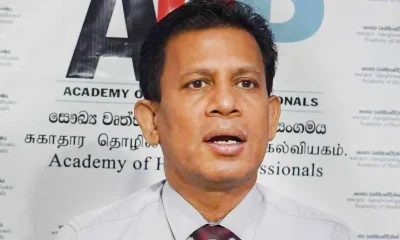
 News7 days ago
News7 days agoSuspension of Indian drug part of cover-up by NMRA: Academy of Health Professionals
-

 Sports5 days ago
Sports5 days agoChief selector’s remarks disappointing says Mickey Arthur
-

 News4 days ago
News4 days agoStreet vendors banned from Kandy City
-

 Editorial7 days ago
Editorial7 days agoA very sad day for the rule of law
-

 News7 days ago
News7 days agoUS Ambassador to Sri Lanka among 29 career diplomats recalled




